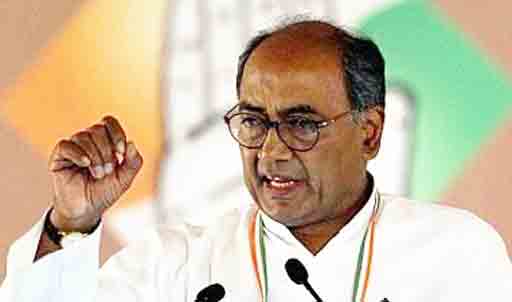INVC NEWS
Bhopal : Digvijay Singh, former Chief Minister of Madhya Pradesh, has leveled serious allegations against the Rashtriya Swayamsevak Sangh (RSS). Singh has claimed that the RSS has infiltrated the Gram Sabhas of scheduled areas, thereby undermining the democratic processes and shifting control to its own ideology. His statements have sparked significant debate and concern among political circles and the general public alike.
Allegations of RSS Infiltration
Control Over PESA Gram Sabhas
Digvijay Singh’s primary allegation revolves around the Provisions of the Panchayats (Extension to Scheduled Areas) Act, 1996 (PESA). He asserts that the RSS has taken control of the Gram Sabhas in scheduled areas through systematic infiltration. According to Singh, Section 13 (3)(k) of PESA, which grants certain rights and powers to Gram Sabhas, is now effectively under RSS control. This, he claims, has been accomplished through the strategic placement of individuals aligned with RSS ideology at various levels of the PESA administrative structure.
Hierarchical Infiltration
Singh details the hierarchy of this infiltration, pointing out that the Gram Sabhas are currently being formed by PESA Gram Mobilizers, who are allegedly selected based on their alignment with RSS ideology. Above them, the PESA Block Coordinators are also chosen from individuals who subscribe to RSS views. The selection of these coordinators is purportedly overseen by District Coordinators and an Undersecretary, both of whom are aligned with RSS. This multi-tiered approach, according to Singh, ensures that the Gram Sabhas are dominated by RSS affiliates, effectively skewing the democratic process in favor of the organization.
Impact on Local Governance
Creation of Parallel Power Structures
One of the significant concerns raised by Digvijay Singh is the creation of parallel power structures in villages. He argues that in areas where the Congress or other democratically elected representatives hold positions of power, the RSS-affiliated Gram Sabhas are being given undue power and preference by the administration. This has led to a situation where two competing centers of power exist within the same village, causing confusion and conflict.
Administrative Bias
Singh alleges that the administration is biased towards these RSS-controlled Gram Sabhas, especially in villages where Congress-elected Sarpanchs are present. He claims that these Gram Sabhas are given priority in governmental work and decision-making processes, undermining the authority and effectiveness of the elected representatives. This administrative bias, according to Singh, is disrupting the natural community and democratic governance structures in these areas.
Implementation of RSS Ideology
Promotion of RSS Agenda
Digvijay Singh further accuses the RSS of using the Gram Sabhas to promote its own ideological agenda. He claims that the organization is implementing its strategies through these local governance bodies, thereby imposing its views and policies on the local population. Singh highlights the use of Gram Sabhas to gain approval for projects and initiatives that align with RSS interests, often at the expense of the local community’s needs and preferences.
Exploitation of Scheduled Areas
Singh is particularly critical of how the RSS uses these Gram Sabhas to facilitate the implementation of projects in scheduled areas without genuine consent from the local communities. He mentions the Tiger Project, which has led to the displacement of numerous villages in these regions. Singh questions the authenticity of the consent obtained from Gram Sabhas for such projects, suggesting that the approvals are manipulated to favor RSS-aligned agendas.
The Broader Implications
Undermining Democratic Processes
The allegations made by Digvijay Singh suggest a systematic attempt to undermine democratic processes in scheduled areas. By infiltrating and controlling the Gram Sabhas, the RSS is allegedly eroding the autonomy and decision-making power of the local communities. This not only affects governance but also threatens the cultural and social fabric of these areas.
Legal and Ethical Concerns
Singh’s statements raise significant legal and ethical concerns. The manipulation of PESA provisions to favor a particular ideology could be seen as a violation of the Act’s spirit, which aims to empower local communities and ensure their participation in governance. The alleged bias in administrative actions also points to a need for stricter oversight and accountability in the implementation of PESA.
















